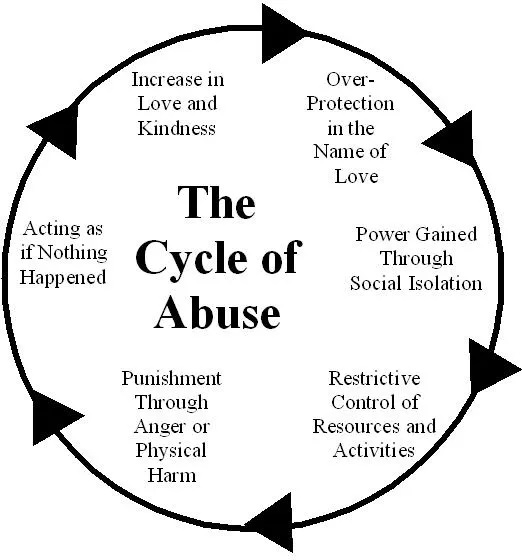Is My Marriage in Another Rocky Patch? Or Is it Emotional Abuse?

We are frequently reminded that marriage is work. Hard work. The baby and toddler years? Brutal. Kids are school-aged? Busy. (And brutal). Teens? Brutal. Sooo brutal. So why in the world is the divorce rate rising for “grey divorce” in Canada? By the time you’re 50, the hard work of parenting should be waning. Now is the time you should be reconnecting as a couple… planning the next phase of your lives… retirement planning in earnest… (Yes we know you should have a plan well in advance, however we also know how kids are expensive and once you have mostly launched them, only then can you really start planning with any real certainty.) So why, WHY? split up when you’re through the worst. Maybe the reason your marriage can’t withstand another rocky patch is because it’s actually an emotional abuse cycle. Maybe what you’re experiencing is actually emotional abuse.
Rolling Through Rocky Patches or Emotional Abuse?
Most presume grey divorces happen because you lose each other through the busy (and brutal) years of raising kids. Whether you’re overscheduled or not, sometimes divide and conquer ends up being mostly divide. So it stands to reason once those years are behind you, you might feel like your partner is a stranger. And during those busy (and brutal) years of raising kids, surely there were rocky patches. Someone is feeling like they are carrying more of the weight. Someone is feeling neglected or jealous of the time spent with high-needs kids. Maybe those rocky patches were actually part of the emotional abuse cycle. And by the time the children are older and the busy and brutal reasons for the rocky patches become fewer although the rocky patches keep happening? That’s part of the cycle.
Family violence in Canada does not necessarily look like screaming obscenities and black eyes. If you’re wondering if you’re being emotionally abused, or even if you are an emotional abuser, you most likely are being emotionally abused. For the simple reason that people in healthy marriages do not randomly start wondering if they are being abused. And actual abusers never really question or worry that they are being abusive, however they will certainly point that moniker at you if you bring it up. That’s called DARVO (Deny. Attack. Reverse Victim and Offender) and it’s one way of identifying an abuser. Here’s what to look for in a nutshell…
The Abuse Cycle
Honeymoon Period
Always being lovey dovey, so many compliments, you can do no wrong, lots of attention, affection, and sex
Tension Building
Always grumpy, you can’t do anything right, you’re walking on eggshells, witholding affection and/or giving you the cold shoulder
Explosion
Loss of temper, yelling, insults, maybe they accidentally-on-purpose break something (notice, it is never something that’s theirs or matters to them)
How the cycle continues…
After the explosion, the honeymoon period may or may not include apologies. Promises to never explode like that again. Sometimes gifts are offered. Often the honeymoon period is followed by a period of calm before the tension starts to build again. And if a relationship has been in this cycle for a long time, eventually the honeymoon period is bypassed almost entirely, with no apologies and a very short period of calm.
The Cycle of Emotional Abuse
The diagram above can reflect more typical physical domestic violence, however the main tenets remain the same. And it’s more indicative of the subtleties that make emotional abuse more difficult to pinpoint. Breaking down the segments into real-life examples of behaviours and actions make it easier to understand. And like anything that follows a cycle, sometimes the experience is not linear. Sometimes steps get skipped. Sometimes things reverse before they surge forward.
Increase of Love & Kindness
In the morning you are greeted with a coffee and a kiss. Or at the very least, a somewhat chipper, “Good morning” instead of a grunt or no acknowledgement at all. Texts are responded to promptly, sometimes with cute emojis or sending flirty memes. An overall involvement in family life and activities. It’s not a honeymoon per se, it’s a general sense of goodness… of hope…
Over-Protection in the Name of Love
Maybe all of a sudden, they worry that a friend or family member does not have your best interests at heart. Maybe they plant seeds of doubt in your co-worker’s intentions. They’d rather not go to that dinner or friend’s birthday party and you feel guilty for going and enjoying yourself. Or you feel confused because you decide not to go and they don’t seem pleased that you stayed home with them instead.
Power Gained Through Social Isolation
Because you rarely accept invitations anymore, you rarely get invited places. Well, I guess they weren’t that great of a friend if you’re not invited to their party. And surely your boss has it out for you, so there is no point in trying to get ahead or progress in your career.
Restrictive Control of Resources and Activities
I don’t know where I want to go on vacation, and none of your suggestions are any good.
I don’t know what I want to eat for dinner, and none of your suggestions are any good.
I can’t stand how messy the house is, and I won’t help you clean it or change my own messy habits.
I’ll threaten to throw everything out and I’ll criticize any plans you have to try to organize things.
I’ll complain that we waste money throwing out food and continue buying groceries that nobody really likes.
I’ll all of a sudden dislike meals you have made for years and always seemingly enjoyed.
I’ll complain that the children are poorly behaved and I won’t enforce any consequences you set for unmet expectations, nor will I read a single word of any parenting book you recommend.
Punishment Through Anger or Physical Harm
There might be yelling.
There might be name calling.
There might be throwing or breaking of random things (and as mentioned above, never something that’s theirs or something they care about).
Or they may ignore you.
They’ll snap, “Nothing!” or “You know” if you ask them what’s wrong.
They’ll leave the house in the morning without saying goodbye and go to bed without saying goodnight.
They’ll intentionally do things that annoy you like leave dirty socks on the kitchen table or leave cupboard doors and drawers randomly open.
Acting As if Nothing Has Happened
This is where the trauma bond starts.
One day, the punishment is over. And you’re still not entirely sure what caused the punishment or why all of a sudden it’s over. However you are relieved that it is.
It’s the intermittent reinforcement that makes you crave the calm, so you dismiss the fact that there is no apology although there might be some thoughtfulness or a gift.
You ruminate on the past days/weeks/months and try to pinpoint whatever it was that triggered the storm in order to avoid it in the future.
And so on… And so on…
And then a new cycle eventually starts. Soon you realize you’re navigating storms even though the skies are clear. You did everything they asked and they don’t notice. Or care. Or they randomly request (insist) on something entirely different. A routine that’s impossible. Goals that are unattainable. You can never predict what will kick off the next cycle only that it will start. And whether it feels like it’s escalating because it actually is or because you’re more aware of it, it’s escalating.
It won’t stop.
Toxic Traits and Examples of Emotional Abuse
Abusers don’t lie awake at night worrying that they are being abusive. And even if you think your abuser is not aware that their actions are abuse, they probably are and that doesn’t matter anyway. The signs of emotional abuse are fairly straightforward.
DARVO
DARVO stands for Deny. Attack. Reverse Victim and Offender. It is the most common response by an abuser when confronted with an example of their harmful behaviour.
Examples of DARVO:
You: “The silent treatment is emotional abuse.”
Abuser: I am not abusive/an abuser! (Deny) I have to keep my mouth shut because I’m so angry with you I’m afraid of what I will say until I calm down! (Attack) The reason I have to give you the silent treatment is because you always/won’t/insert-reason-he-has-to-be-angry-with-you (Reverse Victim and Offender).
You: “It hurt my feelings when you made fun of my age.”
Abuser: I was just joking! (Deny) You’re too sensitive! (Attack) You tease me about lots of things and I never say anything! (Reverse Victim and Offender)
You: “Are you going to clean the bathrooms? It’s your turn.”
Abuser: I’ve been so busy doing all of these things! (Deny) Holy Hell you are such a nag, no wonder the kids tune you out. (Attack) You are always out doing God knows what I have to pick up all the slack around here and I’m exhausted. (Reverse Victim and Offender).
Abuser: “Thoughts on dinner?”
You: “Sorry, I haven’t had a chance to think about it yet today. Is there something in particular you fancy?”
Abuser: I’m too busy today to think about it. (Deny) I’m sick of everything, we always have the same dinners and I’m so tired of them all. The kids are so picky why does everything we do have to revolve around them, including what we eat? (Attack) I never know what’s happening around here so there’s no point in me cooking something no one will eat or be around to eat. (Reverse Victim and Offender)
Gaslighting
Technically, DARVO is a form of gaslighting. We all know by now that the term comes from the movie Gaslight where the bad guy husband fiddles with the gaslights to drive his wife nuts because she can see that they’re dimmed and he denies this. The simplest form of gaslighting is when an abuser conveniently can’t remember something of importance (to you). Maybe it’s something hurtful that they did or it might be something as simple as telling them where you left a list of tasks for them to do. They don’t remember, so did you even tell them? Did that really happen?
It sounds small enough and when it happens time and time again, the compound effect is significant. You can’t trust yourself so you’re not really sure what’s real anymore.
Humiliation & Criticism
Humiliation and criticism during emotional abuse is often far more subtle than someone calling you a bad name or swearing at you. Abusers can recognize that is abuse and don’t want others to see it. That’s why a marriage that is emotionally abusive literally feels like death by a thousand cuts…
- It’s belittling your accomplishments. (“I got promoted at work!” “Well that’s a fake title and the raise is so small will it even cover how much extra work you’ll have?”
- It’s blocking any efforts you might make for self-improvement. (“I’m trying to cut back on total sugar consumption and that means limiting fruit as well.” “No one ever got fat from eating too many apples.”)
- It’s kicking you when you’re down. (“The laundry is piling up, I’m so behind.” “Well if you didn’t sign Billy up for all of those lessons you’d have more time to get things done.”)
Isolation
Subtle digs at close friends and family members can evolve into avoiding social situations and events where others will be present. Or reducing your enjoyment of them. Complaining that dinner is always late when you go to your sister’s for a family gathering may turn into you being stressed out and looking at the clock the entire time while you’re there. Constantly finding fault with friends or teammates may result in you avoiding social situations or team events, and enjoying them less.
The Good Times are Part of the Abuse
Here is why breaking a trauma bond is so difficult and why emotional abuse cycles in marriages often repeat for years and even decades. The good times are so good. Would you really throw away 5-10-20+ years of marriage for arguing over what to make for dinner? For not helping with the laundry?
Understanding that the good times are actually emotional abuse helps people understand what an emotionally abusive marriage actually is. No one could withstand the bad times if things were always bad. The good times keep us hooked. The good times are what we cling to when the bad times are so bad. The good times are what we think are real, and what we seek to return to if only.
And the sad thing is it’s the bad times that are really what’s real.
















